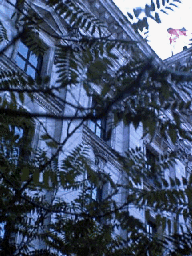

In West Germany there is enormous overcrowding. The influx of East Germans has exacerbated a pre-existing problem. Many ethnic Germans from Poland, the Soviet Union, Rumania and elsewhere, plus asylum seekers from all over the globe have been crowding into this little country in past years. West Germany took in 770,000 people last year, 343,000 from East Germany. Thus far this year, 90,000 have come across. For a nation of 60 million about the size of Oregon with its infrastructure concentrated on 11 percent of its landmass, this is a very severe problem.
In 1989, the West Germans were 800,000 housing units short. Since social services are automatically extended to all refugees, these are severely strained. The job market is oversubscribed. Nerves are getting frayed. The welcome party is over. The situation grows ever more acute. Between 1500 and 2000 people leave East Germany daily.
This all spells rapid unification, so rapid that neither government, West nor East, sleeps at night. Many nations and many individuals have raised objections. There are many hurdles. There is no peace treaty between West Germany or East Germany and the Allies. The European Union and NATO have to be considered.
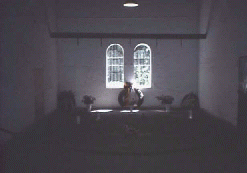
Some voices raise moral issues and remind us of the millions of WW II dead. The single most hideous feature of Nazi regime was,after all, the death camps where millions were exterminated, most notably six million European Jews. The killing of the Jews was the sacred core of the Nazi mission. In this the German people colluded and complied. Twice within a lifetime war emanated from their land. A shroud of guilt still hangs over the German people. Some say that Germany should never reunite, that it be perpetually divided as a mark of Cain for these atrocities. Others fear that the memory of the Holocaust will diminish if Germans reunite. Conscientious Germans- and there are many - would agree that there has been too little coming to grips with the issue of the Jewish genocide, that the issue is not dealt with fully in schools, and generally repressed. After the war there was the necessity to go on with life and awareness was not what the Germans wanted in the '50s and '60's. They wanted good food and good clothes and good cars, a good life and poor memory. But I see more hope for the flame of memory if the two Germanies unite. In East Germany the populace believes it was the fascist leaders alone who were responsible. Only now is the recognition beginning to glimmer that it was the German people who were responsible.
The East Germans have shouted "Fascist" at the West for forty years, the West Germans have shouted, "Communist" at the East,and the truth has gotten pulverized between the grindstones of ideology. There is a better chance that this will cease after reunification.
Of course the main fear is economic: the combination of West Germany's capital and technological know-how with a relatively well educated East German work force of nine million, plus their adherents, makes 16 million new consumers, hungry for the products of capitalism. The idea of a new economic giant 80 million strong in the heart of Europe, makes everyone nervous. It is the classic problem with the Germans all over again, they are too successful, and success breeds fear. The times have changed, however, and now West Germany is tied into the European Union and will probably bring in East Germany as well. Militarily, the new Germany will not be significant. The Germans lack the ideology, they have no aspirations to empire, and even at 80 million they will be a small nation.
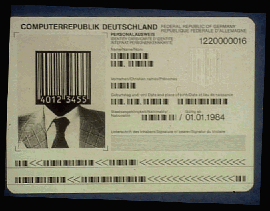 In West Germany, there is continual vigorous,feisty, debate; as in this poster by Klaus Staeck, a jab at alienation and government interference in private life. The press is free, there are citizens' initiatives,demonstrations, protest marches. West Germany has achieved a degree of personal freedom and democratic consensus that is exceptional for the world as a whole. The East Germans will embrace democratic structures readily. They are thirsting for them. And the new Germany together with France will lead Europe into a United States of Europe.
In West Germany, there is continual vigorous,feisty, debate; as in this poster by Klaus Staeck, a jab at alienation and government interference in private life. The press is free, there are citizens' initiatives,demonstrations, protest marches. West Germany has achieved a degree of personal freedom and democratic consensus that is exceptional for the world as a whole. The East Germans will embrace democratic structures readily. They are thirsting for them. And the new Germany together with France will lead Europe into a United States of Europe.
The more difficult task for the new nation will be humanizing capitalism. Max Frisch, the venerable Swiss novelist, expressed his doubts recently about the Western first world society. This past December, he wrote,
"The most obvious misery in capitalist democracy is the misery of buying power without hope, stupefaction through the goods we buy, free-time spent in traffic jams and in the service of our economic growth. We are a first world society whose highest expression is its economic growth, ridden with a mania for profit and at its core, diseased."
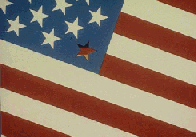 From the German perspective, the United States needs to re-think its junior partnership role for Germany. The Germans have continually helped stabilize the dollar through thick and thin. The Germans are tired of supporting erratic, shortsighted U.S. monetary policy.
From the German perspective, the United States needs to re-think its junior partnership role for Germany. The Germans have continually helped stabilize the dollar through thick and thin. The Germans are tired of supporting erratic, shortsighted U.S. monetary policy.
--The artist,Klaus Staeck satirizes Germany's relationship with the U.S. in the poster at the left, where one of the stars bears the colors of the German flag. The implication of course is, 'good little Germany.'
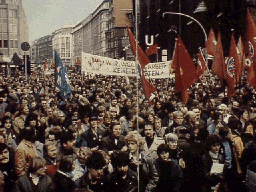 They are also tired of having their country be a powder keg. Germany is bristling with American short range nuclear rockets, foreign and domestic soldiers and war plans designed to kill other Germans. Enormous protest marches took place in Germany and Holland during the '80s. The lack of serious arms control during the Carter and Reagan years became a major issue in West German politics. No German government dares ignore this issue. The United States must invent a new policy for Europe. Division for Germany and containment of the Russians has had its day. While we are revising our European policy, possibly we can begin to tear down our own version of the Berlin Wall: the military budget.
They are also tired of having their country be a powder keg. Germany is bristling with American short range nuclear rockets, foreign and domestic soldiers and war plans designed to kill other Germans. Enormous protest marches took place in Germany and Holland during the '80s. The lack of serious arms control during the Carter and Reagan years became a major issue in West German politics. No German government dares ignore this issue. The United States must invent a new policy for Europe. Division for Germany and containment of the Russians has had its day. While we are revising our European policy, possibly we can begin to tear down our own version of the Berlin Wall: the military budget.
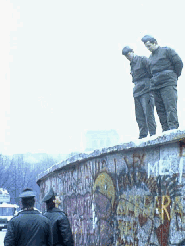
Berlin has already started knitting together in the past few months. In a few years the physical scars of the Wall will be healed.
My personal wish for Berlin, that old, tough, vital city, is that as capital of the new Germany, it fulfill the legacy of its spiritual-geography as median point between Amsterdam and Leningrad, between Western enlightenment and eastern spiritualism, a city where the arts continue to blossom, where ideas meet and are transformed.
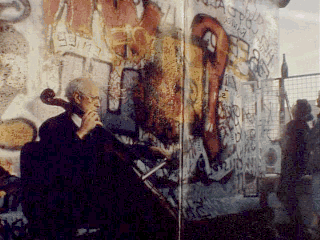
The incontrovertible fact is that the German have the right to determine their own destiny. On March 19 there will be elections in East Germany. In West Germany there will be elections in December. It is possible that Germany will unify this year. The process will not be easy for either side.
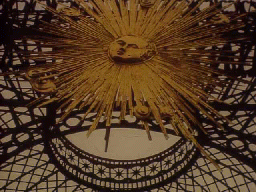 |
Auf Wiedersehen in Berlin!
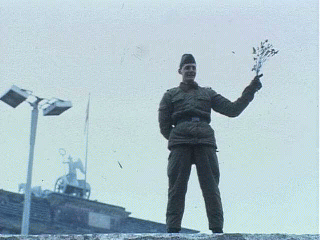
Return to top of this page, Part 10. The Road to Unification or, switch to another Part:
1. Berlin at the End of WW II
2: The First Postwar Decade
3. The Raising of the Wall
4. West Berlin thrives
5. East Berlin, a tourist attraction
6. East Germany during the Wall
7. Bringing down the Wall from within
8. East meets West
9. East German Problems
A follow-up presentation, "German Unification, Five Years After," treating the years 1989 to 1994 is also accessible.